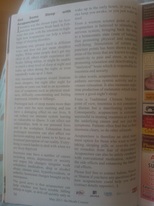 Insomnia was the chosen topic for Acupuncture Awareness Week back in February this year, with the intention to highlight how acupuncture can help a whole range of sleeping disorders. Insomnia may present itself in different ways and does not just mean sleepless nights. While some people don't get any sleep at all, others might experience difficulty falling asleep, or might be unable to reach a deep level of sleep at night and wake up often during the night, or even repeatedly wake up at 2-4am. Any insomnia symptom would frustrate most sleepers, but night after night for months or years can lead to an accumulation of symptoms such as physical tiredness, difficulty concentrating and feeling depressed, irritable or lethargic. Prolonged lack of sleep means more than a slow start the next morning and can have a damaging effect on our lives. It can reduce our immune system leaving us vulnerable to illness. It can affect our relationships, both in our personal lives and in the workplace. Exhaustion from prolonged insomnia can also affect our decision-making and cause us to have an irrational perception of our reality. Everything is much harder to deal with when we are sleep deprived. Insomnia may have a number of causes including stress, depression or anxiety and major life changes; irregular work schedules; medication, drug or alcohol abuse; chronic pain, hyperthyroidism, or arthritis; hormonal changes brought on by menopause. The good news is that acupuncture can help whether you have trouble falling asleep at night, or drift off quickly only to wake up in the early hours, or your worries keep you awake, or you just wake up tired. From a western science point of view, acupuncture is believed to stimulate the nervous system, bringing back the body to a homeostatic state (state of balance), thus promoting physical and emotional well-being. Stimulation of certain acupuncture points has been shown to affect areas of the brain that are known to reduce sensitivity to pain and stress, as well as promoting relaxation and deactivating the “analytical” brain which is responsible for insomnia and anxiety. In other words, acupuncture reduces sympathetic nervous system activity and increases relaxation. It also increases night-time production of melatonin which helps ensure a good night's sleep. From a Traditional Chinese Medicine point of view, insomnia is not considered a disease but a manifesting symptom. Consequently, acupuncture is extremely successful in treating insomnia as it treats the underlying causes and not just the symptoms. Patients often find that as their insomnia clears, so do other ailments. Acupuncture is therefore an ideal treatment option for those who want to avoid taking sleeping pills or over-the counter remedies from fear of dependency. Acupuncture can also be safely combined with conventional medication, reducing the side effects and enhancing the beneficial effects.
0 Comments
Leave a Reply. |
AuthorNiamh Muldowney, owner, Anam Mai Acupuncture Archives
June 2016
Categories |
Clinic DetailsThe Treatment Room, CityNorth Hotel, Gormanston, Co. Meath
|
Copyright © 2022 - Niamh Muldowney, Lic. Ac., Cert Nanjing, Dip. Ac., Dip. BM, MAFPA |
What our Clients have to say....Karen, DublinI’d like to thank Niamh for all her treatment and care during my last pregnancy. I came to Niamh requesting help to keep my blood pressure down because on my previous pregnancies I was on medication for BP which I wanted to avoid on my third pregnancy. Niamh treated me on a regular basis and I avoided medication and high BP issues. I also had 2 previous inductions and I really wanted to avoid a third induction. Niamh started pre-induction treatment a few weeks before my due date and then worked up to the full induction the week of my due date and I was delighted when I started labour myself 3 days after my due date and baby was born soon after that. Niamh did a great job and gave me the outcome that I wanted. I’d highly recommend Niamh because she is friendly, approachable, very professional and thrives to achieve the best treatment for her clients.
|
|
 RSS Feed
RSS Feed